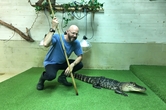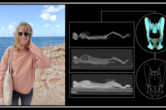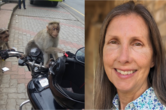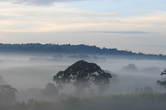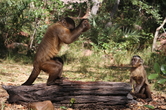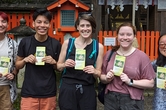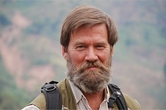In Remembrance: Charles T. (Chuck) Snowdon, 1941–2023
—Michael A. Huffman
--------------------------------------------------------------------------------------------------
Chuck Snowdon, a world renown primatologist, died of complications due to COVID on January 8, 2023. He was a Professor of Psychology at the University of Wisconsin for 44 years and retired in 2012 as a Hilldale Professor. Chuck was a dedicated scientist and teacher, publishing many articles and advising over 35 students as undergraduates and in graduate studies. During his tenure, he served as chair of the Psychology department, director of the Honors Program, and editor-in-chief of Animal Behaviour and Comparative Psychology journals. The word “retirement” didn't apply to Chuck. He continued to contribute to the UW and chaired the faculty advisory committee to the Study Abroad program, served as a University Ombuds and was a member of the Psychology Department Board of Visitors. He continued to write and edit journal articles, mentor graduate students and collaborate with colleagues in writing new scientific papers. Chuck had one more visit to the field planned to see the cottontop tamarins in Colombia but he died 10 days before the trip.
Primatology was a fundamental component of Chuck's research. His captive research involved marmosets and tamarins who display cooperative infant care both in captivity and in the wild. He and his students studied vocal and chemical communication, social cognition, social development, behavioral endocrinology, and paternal behavior in Callitrichid monkeys in captivity and in the wild.
The research in his lab paralleled a continuing long-term field study in Colombia led by his former graduate student, Anne Savage. Graduate student research projects included field studies -on cottontop tamarins (Colombia), pygmy marmosets (Ecuador), common marmosets (Brazil), whales (Argentina), gorillas (Rwanda), chimpanzees (Tanzania), vervet monkeys (Kenya), and chacma baboons (Botswana).
His significant legacy and impact lives on through his many students, who today hold leadership positions in academia, conservation organizations, primate corporations, and government agencies, where they continue to purse excellence in primate research. Chuck invested heavily in each of his students. He worked both professionally and personally to help them build skills that allowed them to prosper in the field of primatology. As a mentor, he challenged his students to think creatively and was dedicated to ensuring they were well-trained as scientists and passionate primatologists. It is because of his dedication to his students and collaborators that they were able to make significant contributions to the field of primatology.
Chuck was very committed to the American Society of Primatologists (ASP). He was a long-term member of the society and attended many of the annual meetings, often to support his students and colleagues for their talks. Chuck served on the editorial board of the American Journal of Primatology and served on the local arrangement committees for the society's meetings. He received the ASP Outstanding Mentor Award and was honored with a symposium by his students and collaborators in 2007 at the meetings in Winston-Salem, North Carolina. In 2014 he received the Distinguished Primatologist Award, ASP's highest honor. In 2019, he was a speaker in the ASP Pioneers in Primatology symposium in Madison, Wisconsin, and at the meetings in Oklahoma in 2021, he stepped up to introduce the speakers for the 2nd Pioneers in Primatology session when the organizers were unable to attend.
Chuck was also a long-term member of the International Primatological Society (IPS), and one of a handful of Founding Members of the IPS Heritage Trust Fund established in 2021. This contribution, combined with his frequent participation at IPS meetings, his mentoring of primatologists from around the world, and his role on the Advisory Board of Primates, the oldest primatology journal established in 1957 in Japan, exemplify his long-term commitment to the international community.
Chuck shared his perspectives on primatology, including some of his most innovative research, in the interview for Primatecast, a podcast series initiated by the Center for International Collaboration and Advanced Studies in Primatology at Kyoto University.
We will all remember Chuck for his genuine warmth, sense of humor, thoughtful questions, and willingness to listen.
